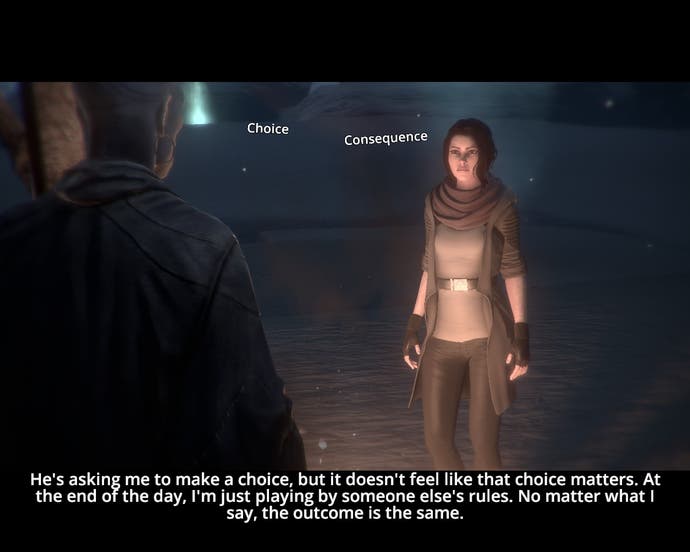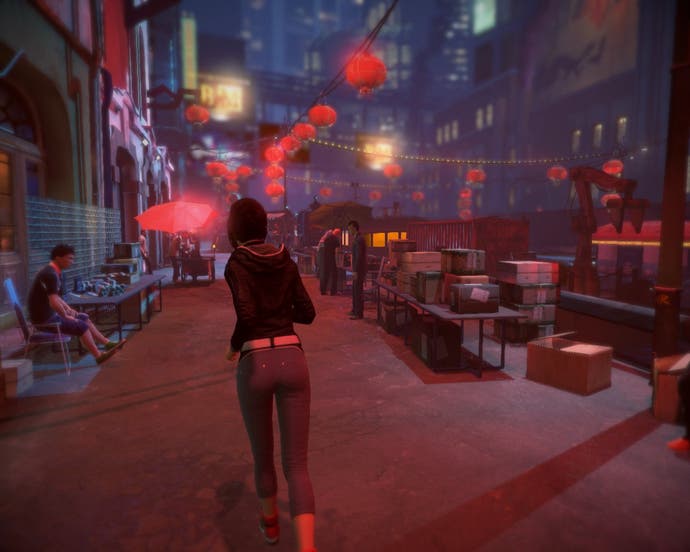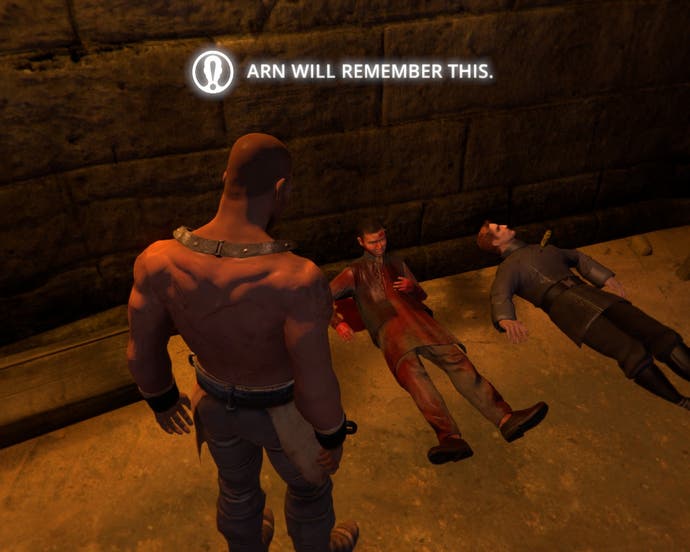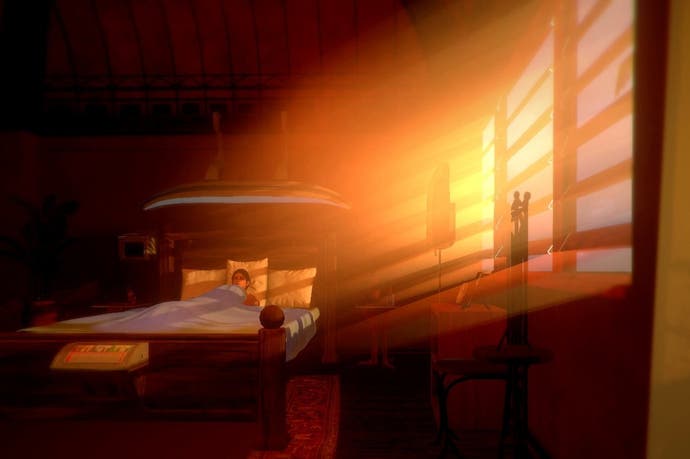Dreamfall Chapters: Book One review
Look before you sleep
Editor's note: We're trying a new approach to reviews of episodic game series like Dreamfall Chapters, inspired by our approach to early access releases and some online games. The debut episode will be reviewed without a score, as here, and we'll review the whole season with a score at its conclusion.
At a time when big franchises now produce at least one annual entry, if not two or more, spare a thought for fans of Funcom's graphic adventure series. With one game released in 1999, a sequel in 2006 and nothing else until now, it's fair to say that those waiting to see what happened to Zoë Castillo next are long overdue some closure.
That closure isn't here just yet, however. As the name suggests, Dreamfall Chapters is an episodic series, directed once again by creator Ragnar Tørnquist, via his own Red Thread Games under license from Funcom. What we have here is the first, somewhat tentative, step back into a universe that hasn't been touched in eight years. As beginnings go, it's pretty good, but it isn't without its frustrations - both for dyed in the wool fans and those coming to the series fresh.

It's the latter group that will suffer most in the early going of Reborn, as this first entry is called. There's a perfunctory text introduction which briefly introduces the concept of two parallel worlds - a cyberpunk future Earth known as Stark and a magical fantasy realm known as Arcadia. We learn that the two are connected by dreams. Beyond that, it's up to you to either remember the events of a game from almost a decade ago, or just dive in and make sense of the fairly dense dual storylines along the way.
Despite token efforts, this isn't a game with much interest in helping newcomers find their feet. It opens with the funeral of a major character from the last game, with no explanation, before depicting a mysterious birth - and then, finally, introduces us to our heroine, Zoe Castillo, in a coma for reasons that, once again, are alluded to only in passing. On the one hand, it's quite exciting to see a game so brazenly and immediately pick up the threads of an unfinished story from so long ago. On the other, if the series hopes to attract anyone but the already converted to future episodes, it's doing a pretty poor job of it.
Even for fans, the game gets off to a clunky start. We follow Zoe, now trapped in the dreamy limbo of the Storytime, hopping from one person's sub-conscious to another, rescuing them from nightmarish loops caused by the dream machines introduced in the last game. After a few of those, we swap to secondary hero, Kian Alvane, awaiting execution in Arcadia. His priority is to escape his fate, using an off-screen prison riot as cover.
It's a disjointed start, and one that is distractingly light on gameplay. There are puzzles, of a sort, but most are of the "look for an object that is right next to you" style. That's when the puzzles aren't being bizarrely obtuse. The first puzzle that really feels like it belongs in an adventure game involves helping Kian to pick a lock. The method employed is so inexplicable and leftfield that the only way you'll stumble across it is because it involves the only things you can interact with. Another puzzle soon after requires you to assemble a rudimentary torch to set something on fire, even though there's a burning candle right next to you.

It's a shame, as the game is otherwise very inviting. It often looks stunning, with the move to Unity 4 allowing for some evocative scenery and, occasionally, impressive character models. This becomes particularly noticeable once you get past the lumpen introductions and get to freely explore Europolis, the city where Zoe ends up after escaping from her psychological prison.
It's a lovingly rendered place, with lots of background detail filled in through advertisements, ambient conversations and other points of interest, all of which are drawn to your attention by automatically highlighted icons. You can easily spend a lot of time just exploring the city - it's not quite an open world, but there's lots to find before you run into the barriers holding you in - and it's at this point that you start to realise the game Dreamfall Chapters could - and should - become.
To get there, though, it needs to change its priorities somewhat. Too much information is doled out through lengthy cutscenes - such as one in which Zoe talks to her doctor for what feels like an age - which are enlivened only by sporadic moral choices.
These are presented in the Telltale style, with stark reminders that a character will remember your response and that the game world has, in some as-yet-unseen way, been shifted by the things you say and do. As naked as the inspiration is, Dreamfall does improve on the system in some crucial ways. Highlighting your choices leads to an internal monologue from the character, expanding on their thoughts on the relevant option. This eliminates the "wait, that didn't mean what I thought it meant" frustration that can come about when asked to pick choices from stripped-back phrases.

Dreamfall lets you see what other players have chosen, again like Telltale's episodic adventures, but it lets you access this data before making a decision, rather than at the end of the episode. In particular, you can link the game with Facebook and it will show you specifically how your friends played each scenario. I'm not convinced that such fourth wall breaking concepts benefit the narrative, but it's undeniably interesting in an "ask the audience" kind of way.
As the game accrues more episodes, I expect this aspect will become more valuable. Right now, there's no real reason to care what the characters think about you. There's an immediacy to surviving the zombie apocalypse of The Walking Dead that means you innately understand the interactions and their implications in the moment, even if the character is a stranger. Here, it's unclear why - or even if - these choices are important, making it a little abstract.
It will take you three or four hours to reach the end of this long-awaited return to Dreamfall's world, and while the experience achieves equilibrium eventually, it's a wobbly start. In particular, it's disappointing that it ladles on tons of non-interactive dialogue scenes yet never really manages to offer newcomers a way into its brilliant but complex tale. Equally, it doesn't yet feel like a true adventure game, with too few puzzles dotted along the way, and solutions that fail to inspire.
And yet, for all that it staggers a little out of the gate, I'm still excited that Dreamfall is back, and looking better than ever. It picks up the story as if the last game only came out last week, and the writing and voice performances are very much in keeping with the distinctive tone of this sparse but beguiling series.
I'm glad that we no longer give scores to each chapter of an episodic game, because right now Dreamfall Chapters has problems. They are, however, mostly problems of the sort that would barely register in the opening hours of a complete game, and will hopefully disappear over time as the story deepens and the gameplay evolves.

